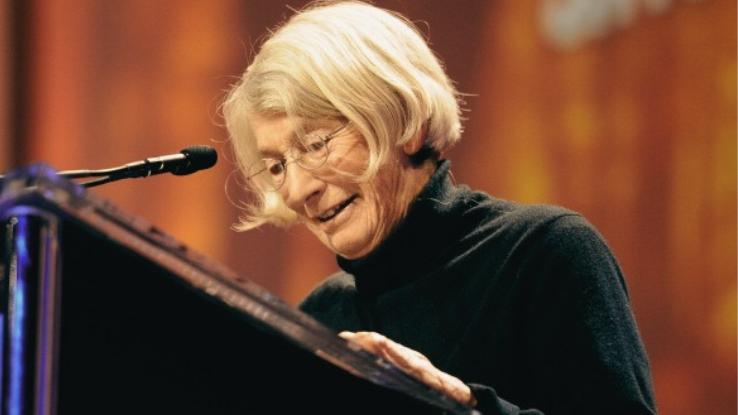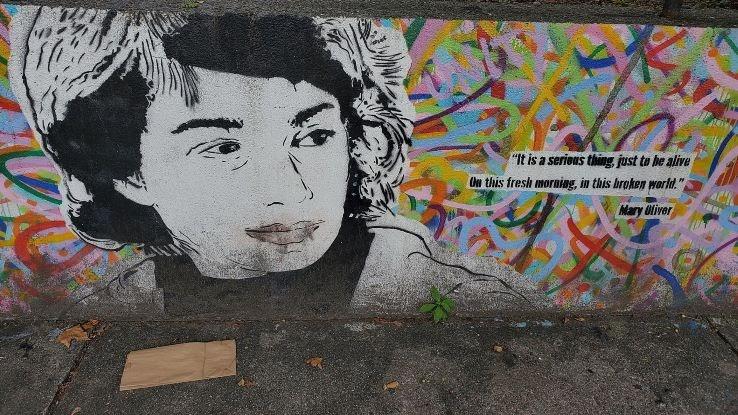Mary Oliver and Here Is the Serpent Again

This Apr, in honor of National Poesy Month, nosotros are shining a light on 1 of the almost honey poets in American history, Mary Olive. For more than 50 years, the poet wrote, read, and fueled the literary scene, all while winning nearly every major literary award in that location is over the course of her career. In fact, Mary Oliver'due south poems have earned her the Pulitzer prize, the National Book Honour, a Guggenheim fellowship, honorary doctorates, and a Goodreads Choice Award.
The poet has a very "at present and then" vibe. She was born during World War II and passed in 2019. The technological advancements and social reforms that happened during her fourth dimension are immense. Living through then many important decades, Oliver'due south insightful poems wish for a ameliorate world and, in some ways, by reading her work today, we can meet that the globe responded positively in some ways. A lot of the ethical questions that Oliver brought upwards in terms of state of war, womanhood, and sexuality have been heard and in some cases, answered.
On the other mitt, Oliver's environmental concerns oasis't quite reached the hearts of many companies and politicians. Mary Oliver has a lot in common with writers from the 19th and 20th centuries: in her poems, at that place's a lot of nature, a lot of walking. Yet, Oliver's pleas for humanity and equality created a modern spirit that lasted well into her later career.
The Dream Work Era
The 1980s were a challenging fourth dimension. Amid the Reagan era, the AIDS crunch, the Cold State of war, and other unsettling occasions of the decade, Mary Oliver found a manner to utilize her art to put words that articulated what people of the fourth dimension were feeling. But the poems in Dream Work are also timeless plenty that people can still get a lot of mileage out of them today.

Wild Geese: The sentiment in this poem was then strong that Mary Oliver eventually came out with a book that used this verse form equally its championship piece. "Yous only accept to permit the soft brute of your body honey what information technology loves," was a downright revolutionary line to take in this 1986 collection. A Pride-next poem, "Wild Geese" probably helped a lot of queer readers during the nighttime times of the 1980s and, probable, continues to practice so today.
Robert Schumann: in this Mary Oliver verse form, the speaker sympathizes with the Romantic composer. Schumann suffered from depressive episodes and never received acceptable treatment for them. Mental illness was however pretty taboo at the fourth dimension, even more so than it is today. This verse form follows the Mental Wellness Systems Act of 1981 that defunded mental healthcare for thousands of people.
Banyan: A banyan is an Indian fig tree. The growth of the tree's seed is quintessential Mary Oliver and a spot-on nature poem.
Members of the Tribe: This poem grapples with life, depressive ideations, the desire to hurt one's self, and the ultimate determination not to practise so. Oliver names other poets and artists, here, and explains the complex nature of going to art for communication even if it makes you sad.
Published in 1995, Blue Pastures is such a great volume considering information technology's about the artistic process and yet still gives that natural, poetic excellence Mary Oliver'southward poems are known for delivering. Some may call these short works "essays," merely why put a label on them? Reading these shorts out loud, one might feel they are at an open mic in a coffeehouse while simultaneously delivering a keynote address at a commencement.

My Friend Walt Whitman: Was this the best collab of the 20th century? No thing your have on prose poems, Oliver'south rumination on Whitman makes 1 want to double fist one poesy collection from each author and read them both at the same time. This is, as the youths say, "legends supporting legends."
Of Power and Fourth dimension: This poem is especially wonderful for creative individuals that piece of work nine-to-five "day jobs." Mary Oliver grapples with the monotony of day-to-day life and beingness at a desk-bound, providing the reader with a resiliency — one that might drive them to create art despite less than ideal weather.
Pen and Newspaper and a Breath of Air: in this poem, Mary Oliver takes on poetry as a whole. Oliver calls out commercialism equally the main reason why at that place aren't more poets and audiences for poetry. This spirit, still radical for today, was manner ahead of its fourth dimension.
The Why I Wake Early Era
George W. Bush. 2 wars. The 9/eleven terrorist set on. When Mary Oliver published her 2004 collection, there was a lot going on. With growing uncertainty at every turn, Oliver stuck to nature, but her aesthetic in Why I Wake Early on continued to "wow" readers.

Why I Wake Early: The title poem is a great place to starting time. I get the feeling that this poem does not take place on a Monday forenoon because the speaker seems delighted and happy to be up early on. An ode to the sunday, this verse form shows that even when we're feeling miserable, the lord's day still gives calorie-free.
Freshen The Flowers, She Said: Merely Mary Oliver could brand floral arrangement seem like the almost soothing thing on globe. Her speaker tells the reader that the action took 15 minutes and that the action itself was music even though nothing was playing.
Bone: This grapples with the physical and the intangible. What is a soul and where can one find it on the body? The question is rhetorical, and all the same, Oliver'south poem feels like the answer to that question.
With all that was going on around Oliver on a macro scale, the writer institute subjects in what was around her. In Oliver's poems, a beetle is ofttimes not but a protrude and a bloom is not only a flower. Her writing ultimately goes back to living and dying. Thus, Mary Oliver poems are ultimately about survival.
As an artist, Oliver was ahead of the curve on a lot of issues, and readers benefit from that insight to this day when reading her work in the 2020s. Thank you to her dandy figurative language, authentic vocalism, and acute literary citizenship, Mary Oliver's poems will continue to sing and sing and sing.
Source: https://www.reference.com/world-view/mary-oliver-poems?utm_content=params%3Ao%3D740005%26ad%3DdirN%26qo%3DserpIndex
0 Response to "Mary Oliver and Here Is the Serpent Again"
Post a Comment